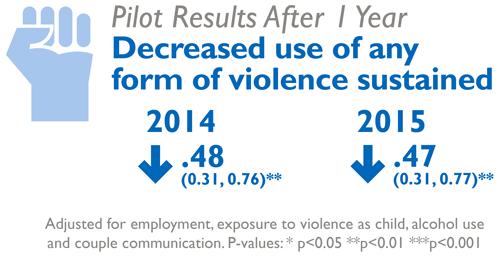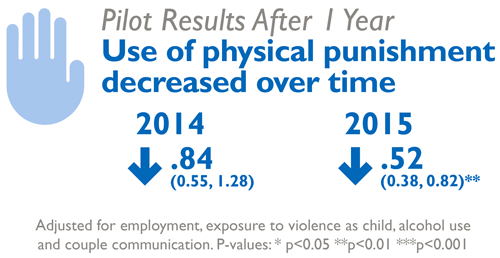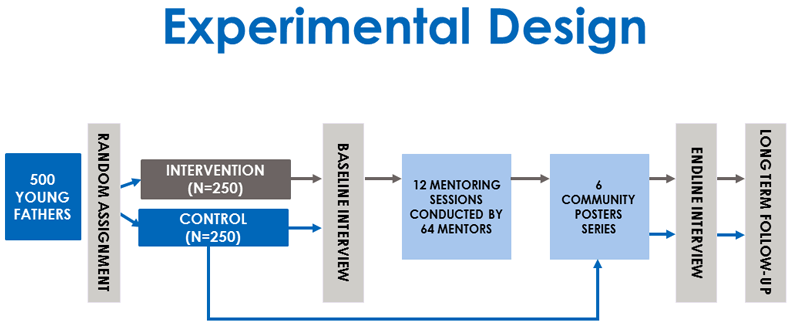In addition to many physical and mental health effects, early childhood experiences of violence are linked to experiences of violence in adulthood. The Responsible, Engaged and Loving (REAL) Fathers Initiative was tested in Northern Uganda as a mentoring program focused on reaching young, first-time fathers before their expectations related to parenting and relationships are well established. This is the story of REAL.
Five years ago, a group of researchers and practitioners started listening to the experiences of young, first-time fathers in Northern Uganda. These young fathers shared their joy in becoming fathers for the first time, but they also shared their struggles in navigating their new roles and responsibilities as fathers. Among these struggles, they described the challenges of becoming a father without the guidance of their own fathers, uncles, grandfathers and male role models who were killed 23 years ago during a conflict in the region. Over the same timeframe, mounting evidence was revealing that early childhood exposure to intimate partner violence (IPV) and/or harsh physical punishment were cyclically linked to perpetration or experience of violence later in life. The researchers realized that developing a program for young, first-time fathers was an opportunity to break the intergenerational cycle of violence in Northern Uganda, while meeting the mentoring needs of these young fathers.
The Birth of REAL
“After REAL Fathers, my violence vanished; I started communicating and working well with my wife. I am responsible now. I look after our child at home most of the time. I advocated to my friends to stop drinking alcohol and battering their wives.” – YOUNG FATHER, NORTHERN UGANDA
This formative research prompted the U.S. Agency for International Development (USAID) to pilot test an innovative mentoring program to teach young fathers about relationship and parenting skills and peaceful conflict resolution strategies to prevent IPV and violence against children. In 2013, the Responsible, Engaged and Loving (REAL) Fathers Initiative was born in the Amuru District of Northern Uganda. The pilot program targeted young fathers between 16 and 25 years old, who were raising toddlers at the time.
How REAL Works
Over a period of six months, community-selected mentors engage with young fathers in group and individual discussion sessions. Each discussion focuses on a theme, including fatherhood, communication and parenting, among others. Wives of young fathers also participate in REAL, helping to select the young father's mentors and participating in two couple-based sessions on couple communication and parenting. A community awareness campaign catalyzes reflection on gender norms, parenting and violence prevention. After the final session, REAL holds a community celebration for young fathers to come to together with their families and community elders to share what they have learned. This public forum provides an opportunity for community members to share successes and challenges and for young fathers to express their commitment to sustain the positive changes they have made.
What We Learned
To understand REAL's short- and long-term effects, we conducted a randomized control trial, assigning young fathers to an intervention group receiving the REAL package or a control group receiving the community poster series only. We triangulated participants' experiences and vantage points by collecting:
- Surveys with 500 young fathers at three time points: before REAL began (baseline), three months after the project ended (endline) and one year after the project ended (long-term follow-up)
- Life history interviews at endline with 20 young fathers to understand their participation in REAL, challenges in adopting new practices and changes in their lives
- In-depth interviews with 10 wives of young fathers at endline to record their insights and perspectives on the program
The results? Our work had a significant, long-term effect in reducing IPV and harsh punishment of children by young fathers. Young fathers participating in REAL were half as likely as those who were not exposed to use any form of violence with their partners (physical, psychological or verbal). These young fathers were also more than twice as likely as those not exposed to use couple communication skills – such as listening to their partner and telling their partner that they appreciated them – in both the shorter and longer term. One year later, young fathers participating in REAL were also half as likely to use physical child punishment.


After one year, participants in REAL Fathers were half as likely to use any form of violence with their partners.
Given these positive and lasting effects, USAID is exploring the feasibility and effectiveness of adapting and scaling up this intervention in new regions in Uganda. The scale-up includes expanding the program in Northern Uganda and adapting the intervention for a new area with scarce resources and low literacy. A new family planning component was also added to test whether the REAL Fathers model could increase modern family planning use.
Preliminary results suggest that men who participated in the REAL mentorship program were less likely to perpetrate violence against their wives and children. REAL participants also reported better couple communication with their partners and more gender equitable norms around caregiving. The results of our scale-up efforts suggest that REAL works in both a pilot setting and when integrated into ongoing programs, and there's evidence that we can integrate REAL into child development programs and that mentors who are less literate can successfully implement the program. These results not only show that REAL is effective and can be expanded within Uganda and in other similar settings around the world, but also reaffirms that young fathers can prevent violence, too.
From November 25th through December 10th, we're highlighting stories as part of the 16 Days of Activism Against Gender-Based Violence. Join the conversation via #16days.
Learn More
- Read the pilot results brief on REAL Fathers
- Read about our efforts to prevent and respond to gender-based violence
- Follow USAID Global Health on Twitter and Facebook
The REAL Fathers Initiative is implemented by Save the Children, in partnership with the Institute for Reproductive Health.



